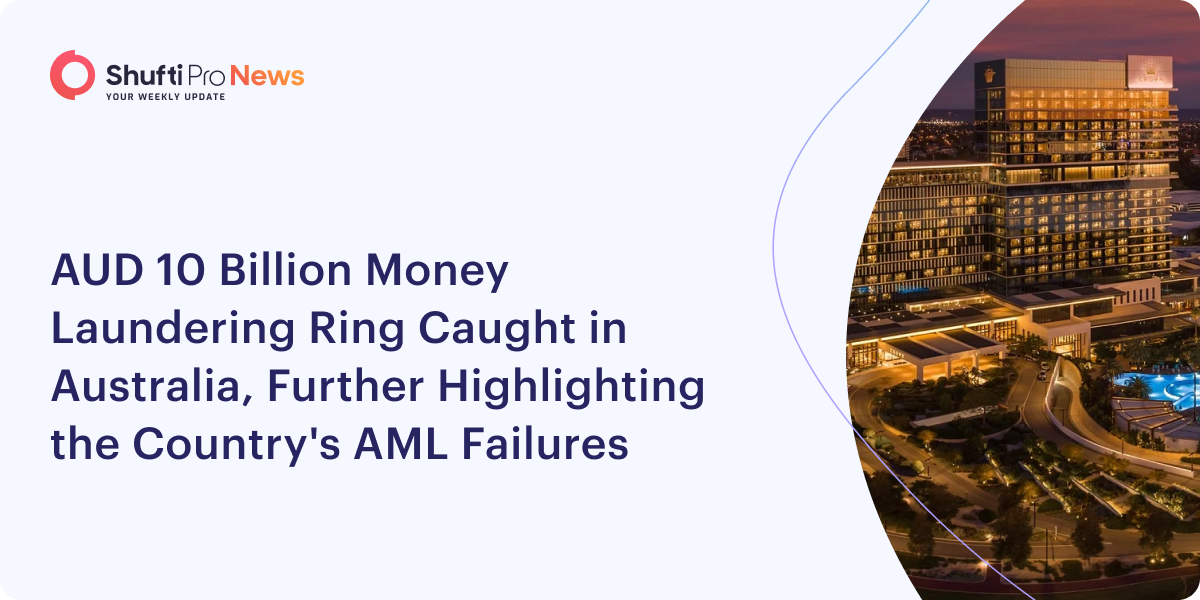AUD 10 Billion Money Laundering Ring Caught in Australia, Further Highlighting the Country’s AML Failures

AUD 10 billion ($6.5 billion) in global money laundering was allegedly uncovered in Sydney by the Australian Federal Police (AFP). It was discovered that law enforcement officials had confiscated real estate, cash, and other luxury items worth hundreds of millions of dollars, alongside arresting nine individuals for money laundering and other criminal charges.
Police in Sydney have broken up a suspected AUD 10 billion ($6.5 billion) money-laundering ring. It has highlighted Australia’s position as a destination of choice in the Asia-Pacific region for laundering money. This issue is particularly evident yearly in the real estate and gambling sectors, with untold billions flowing through the country’s economy.
It is estimated that in 2020, Chinese-linked criminals laundered more than AUD 1 billion through the real estate market alone, according to the Australian Transaction Reports and Analysis Centre (Austrac), the national financial intelligence agency. Moreover, corruption and organised crime groups from the region are buying and selling property throughout the country, according to research conducted by Transparency International.
CEO of Transparency International Australia, Clancy Moore, stated “Australia is the go-to destination for illicit financial flows in Asia-Pacific,” continued, “We know that billions of dollars are being laundered into our real estate sector and other parts of the economy every year.”
Due to the weak anti-money laundering and counter-terrorism financing (AML/CFT) framework of the country, it has become the money laundering hub of the region. Although successive Australian governments have implemented AML/CFT controls since 2007, they have not conducted measures to compel “gatekeeper professions” – companies or professions not involved in financial transactions – to comply with the laws. Various companies provide real estate, planning, litigation, accounting, and trust services. Instead, attempts from all political parties have failed. The Australian AML/CFT Regulations, referred to as “Tranche 2”, have been adopted by only three jurisdictions in the world. When carrying out a real estate transaction, these professionals don’t need to verify funds or report suspicious activity.
Having failed to implement Tranche 2 reforms, Australia’s government and law enforcement agencies, positively viewed by anti-money laundering and counterterrorism officials, cannot combat money laundering effectively.
Nathan Lynch, a Thomson Reuters analyst in the Asia-Pacific region for regulatory intelligence, said, “A financial intelligence unit can only work within the laws it is handed. That’s where the Australian paradox lies: other countries look at Austrac as a strong partner and a leader, but at the same time, they look at the political system, and they wonder how these things sit together? It doesn’t make any sense.”
However, there is hope for change in the near future. The Australian government launched a public consultation in April of this year regarding Tranche 2 reforms. There will be an acceptance of submissions until June 16, 2023, by the attorney general’s department. The Treasury consulted upon an overdue public beneficial ownership register at the end of last year.
The country’s AML/CFT community has welcomed these developments. There is, however, a race against time for Australia. The Financial Action Task Force (FATF), the anti-money laundering watchdog, is expected to evaluate it between 2025 and 2026.
The FATF could greylist the bank if it doesn’t update its AML/CFT rules by then. Taking this step would worsen Australia’s already lousy reputation and subject it to enhanced international monitoring.
“Australia’s fourth round mutual evaluation [by the FATF], which took place in 2015, excoriated the country and its political masters for not acting on the gatekeeper professions,” says Mr Lynch. “Now Australia is facing its fifth round of mutual evaluation. If there hasn’t been progress by then, the country will get pummelled on the international stage.”
In the midst of horrific money-laundering scandals, the FATF will conduct its upcoming evaluation. Austrac filed a complaint in March 2022 against casino operator Crown Resorts, alleging that it allowed just 60 individuals to handle about AUD 70 billion through its premises, in which “high money-laundering and/or terrorist financing risks were indicated.”
Another casino operator, Star, has been sued by Austrac for fraud and money laundering. Charles Littrell, a former Australian prudential regulator and senior adviser to the Bahamas Central Bank, said, “What happened at places like the Star and Crown casinos is not complicated. When you’re facilitating international gangsters and junkets, much dubious business will happen. But it’s difficult to give up that profit stream.”
“The key to stopping big-ticket money-laundering is wanting to stop it. It’s that simple. If you look at Australia, it has decided that it’s more profitable to do business with gangsters than it is to refuse to do business with them,” Mr Littrell adds. Now it’s up to the political class in Australia to act.
Suggested Read:

 Explore Now
Explore Now













